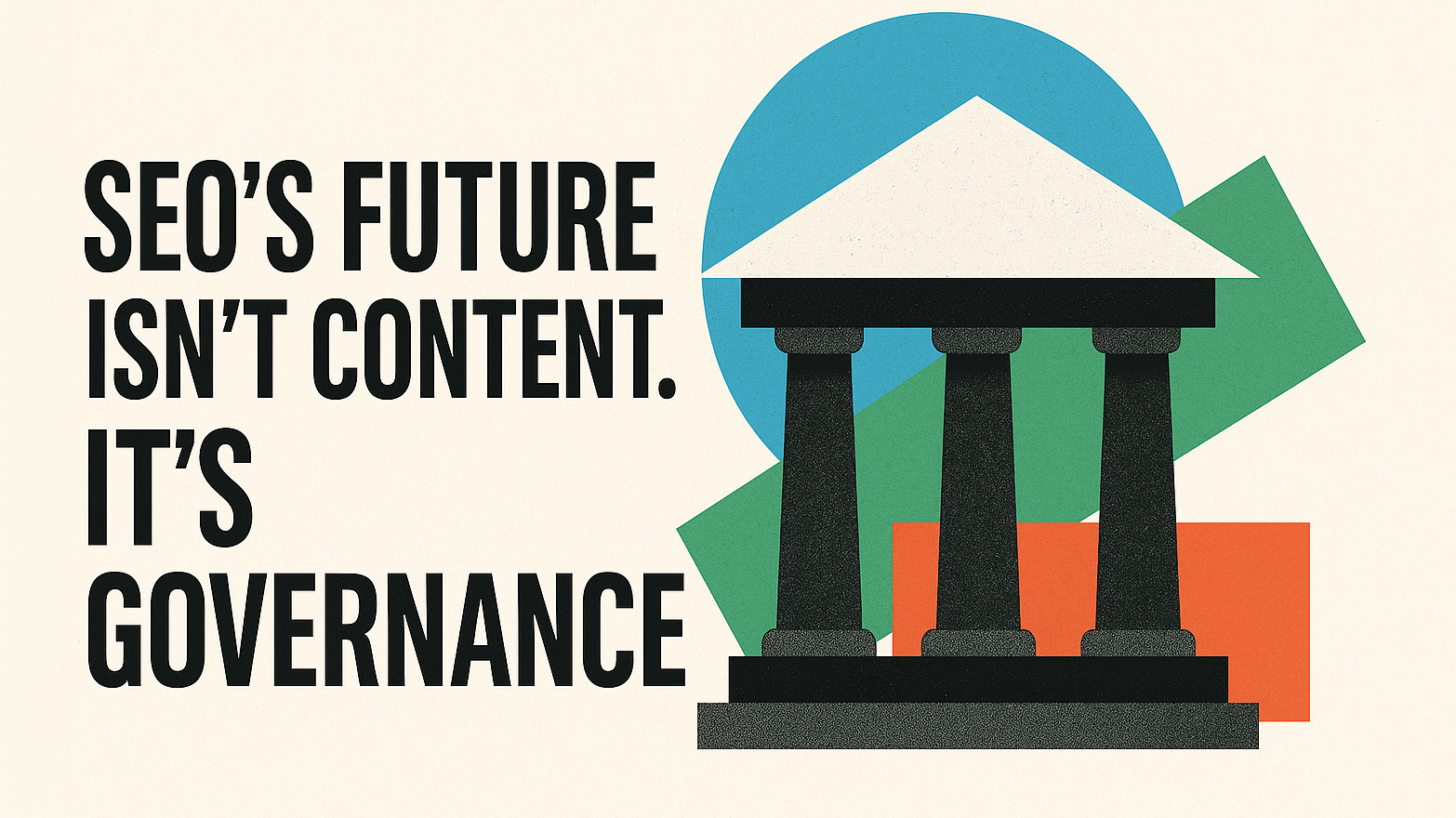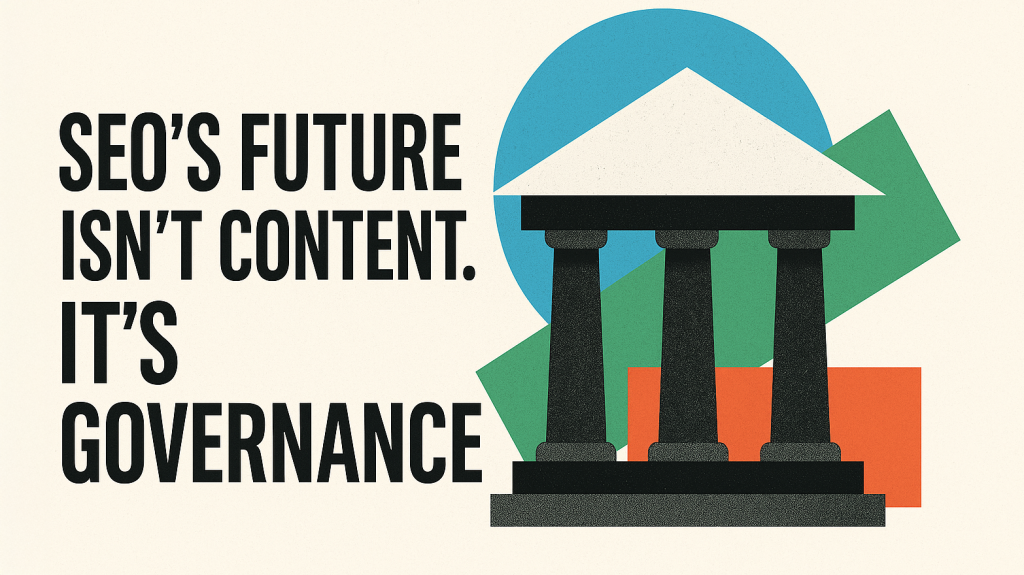SEO’s future isn’t content. It’s governance

Every few years, SEO gets a shiny new acronym. Voice search. AMP. E-A-T. Each promised to rewrite the rules, and each eventually found its way into the same corporate graveyard of experiments and half-baked roadmaps.
I know, because I bought in. For a year and a half, I buried myself in schema markup—building page-level knowledge graphs, connecting entities, mapping relationships until entire sites resembled semantic webs. It was meticulous, elegant, even beautiful in its own way. And it delivered nothing. Not because technical work doesn’t matter—SEO is inherently technical. The issue in enterprise is that Google is a black box. You can pour months into structured data and still have no proof of impact. And when technical effort doesn’t ladder up to outcomes the business can recognize, leadership moves on without us.
That’s the gap: SEO leaders must prioritize and align on strategic goals, not just technical execution.
GEO exposes the limits of SEO
Now the industry is circling around Generative Engine Optimization (GEO) with the same energy. Use the right schema. Reformat content into chunks. Optimize for citations in AI Overviews. Some even suggest publishing “LLM-friendly FAQs” or rewriting content to mimic generative outputs. It’s the same playbook that surfaced during featured snippets, voice search, and AMP: act fast, package advice, sell the illusion of control.
But here’s the reality: These tactics don’t scale in an enterprise. They don’t hold up across hundreds of markets, thousands of pages, or the messy sprawl of global product content. And they don’t convince executives. No CMO cares that you’ve been cited in an AI Overview when brand demand is softening. And no CEO is going to see value in SEO because you reformatted content into semantic chunks. What they care about is whether marketing is building pipeline maturity and coverage—and whether your function is visibly contributing to it.
Generative engines don’t just reduce clicks—they compress what used to be multi-touch discovery across dozens of websites into a single answer. That’s bad news for enterprises: It strips away the context you control, gives you fewer chances to influence perception, and leaves your brand fighting for representation in an answer you don’t own.
The funnel is a myth
For years, B2B marketers have comforted themselves with neat stages like TOFU, MOFU, BOFU, as if buyers marched predictably from awareness to consideration to decision. It gave teams something to measure, something to label content with, something to report up. But it was always fiction—a convenient story to feel in control.
In reality, humans don’t buy in stages. They buy when they’re ready, from whichever piece of content makes them feel understood. Sometimes that’s a thought leadership post. Sometimes a case study. Sometimes a stray LinkedIn comment. Most of your audience is out of the market 95% of the time, and when they enter the 5% that’s ready, they won’t politely walk through your funnel. They’ll look for whoever already owns mindshare around the problem they need solved.
Discovery now starts with LLMs
This is why GEO matters. Generative engines are becoming the first touch in discovery, shaping how problems and solutions are framed long before a buyer ever hits your website. In-market buyers still rely on Google when they’re validating vendors or comparing specifics, but by then the shortlist has often been made. If your brand isn’t represented consistently in LLMs early, you may never make it to that last touch at all. That’s not a measurement problem. That’s a brand problem.
The GEO strategy you need
So what should enterprise SEO leaders actually do? You can take control by prioritizing three things in your GEO strategy:
Get governance right
First, audit governance, not rankings:
- Where are product names inconsistent across regions?
- Where are entities unlinked, or worse, competing with each other?
- Where is the brand failing to articulate its core problem clearly enough that an LLM could stitch it into a coherent answer?
If you don’t have those answers, you don’t have a GEO strategy.
Focus on metrics that matter
Second, change what you measure:
- Stop reporting on clicks and impressions.
- Start reporting on demand signals, coverage of in-market accounts, and share of mind against the core problems your company solves.
- Frame GEO in the language of pipeline maturity and brand strength, not SERP visibility.
Some leaders think the solution is to double down on content—to publish more, hire editors, and chase authority signals in the eyes of Google and LLMs. That instinct isn’t wrong, but it’s incomplete.
Content alone won’t save you if your enterprise knowledge is fragmented, inconsistent, or invisible to generative systems.
Recognition doesn’t come from publishing volume. It comes from whether your organization’s knowledge is structured well enough that an LLM can retrieve and reuse it with confidence. That’s not an editorial challenge. That’s a governance challenge.
Become a knowledge architect
Third, step into the role of knowledge architect. This is uncomfortable for many SEO leaders who’ve built careers on keywords, rankings, and content production—treating SEO as a publishing engine measured in pageviews. Schema markup already taught us the limits of that approach: Page-level knowledge graphs were never enough.
Being a knowledge architect isn’t about injecting JSON-LD into templates. It’s about driving your enterprise toward a shared ontology—a system of entities, relationships, and standards that makes your company’s knowledge consistent, connected, and retrievable. You may not own that ontology outright, but you’re often the only leader who understands how the web works, how LLMs need context, and how messy data sabotages visibility.
Your role is to push the enterprise toward order, not because it earns citations, but because it makes the company’s knowledge tangible enough for generative systems to trust and reuse. If you don’t step into that role, someone else will. And when they do, it won’t be called SEO anymore.
Bring your entire team along for the ride
Finally, educate up and down:
- Your team needs to understand that “chunking” content or chasing citations is busywork, not strategy.
- Your executives need to understand that GEO isn’t a fad but a structural shift in how demand is captured and pipeline is built.
Connect those dots, and you keep SEO relevant at the highest level. Fail, and you risk being reduced to an executional function leadership barely acknowledges.
GEO is a stress test
GEO isn’t a silver bullet, and it isn’t the future of SEO. It’s a stress test—one that reveals whether leaders are ready to evolve beyond keywords and content factories into something bigger.
GEO is also an opportunity. Keep treating SEO as a traffic shop, and your influence will shrink with every generative query. Step into the role of architect for how your company’s knowledge is structured, connected, and made visible in the systems executives themselves now rely on, and your relevance only grows.
The uncomfortable truth is this: SEO won’t die because of Google or because of LLMs. But SEO leadership will become irrelevant if its leaders can’t evolve. And when that happens, SEO won’t be rebranded. It will simply be replaced.
Discover how you appear across LLMs like ChatGPT, Perplexity, and Google AI, and get AI-powered strategy recommendations.








Recent Comments